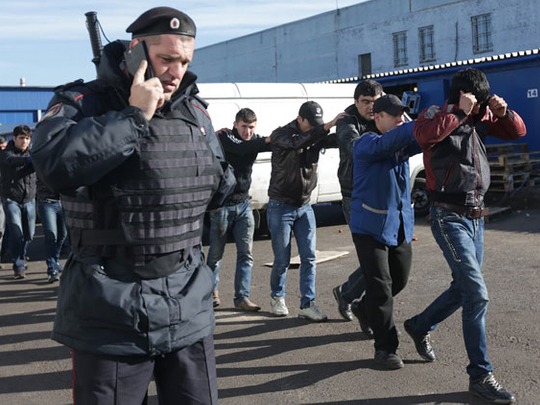
Moscow: The Moscow authorities on Monday scrambled to calm intercommunal tensions after the Russian capital was rocked by some of its worst ethnically-fuelled rioting in years, sparked by the killing of a Russian allegedly by a Muslim migrant from the Caucasus.
Seeking to avert further protests, Moscow police detained 1,200 people in a raid on migrants as officials vowed to crack down on vegetable wholesale markets in the capital which employ hundreds illegally.
The initially peaceful protest in the Biryulyovo district of southern Moscow to protest the killing of Yegor Shcherbakov, 25, rapidly descended into bloody clashes with the police that left the glass doors of a shopping centre smashed and cars upturned.
Police said Sunday evening that 394 people had been arrested at the riots and on a later raid on a local train. The RIA Novosti news agency said all would be released with the exception of 72 whose cases would be sent to court.
Police said that the situation in the district was now calm after they brought in hundreds of reinforcements in a bid to deal with the crisis and enforced their extreme “Vulkan” operation plan which is used in case of a terror attack.
Moscow mayor Sergei Sobyanin announced that a special operation centre had been set up to deal with the situation, and that he had already reported about the crisis to President Vladimir Putin.
After a largely peaceful protest on Saturday, the rioting on Sunday began when a group of protestors attacked a wholesale vegetable market where they thought the suspected killer of Shcherbakov was hiding.
In a move aimed at showing they took locals’ grievances seriously, Moscow police Monday raided the produce market and detained 1,200 people for identity checks.
“About 1,200 people have been taken to the police in the course of a raid on a produce market in Biryulyovo to check their criminal connections,” a representative of the Moscow police said.
Interior Minister Vladimir Kolokoltsev said more had to be done to deal with the situation with wholesale vegetable complexes in Moscow, which often employ large numbers of migrants in shadowy circumstances.
“Otherwise all provocateurs and extremists will use any possibility to get young people onto the barricades,” he said at a televised meeting.
Shcherbakov was murdered overnight Thursday in the area in front of his girlfriend as they walked out of a billiards club.
Media said that security footage showed his killer was a man of “non-Slavic appearance” from the Northern Caucasus, leading nationalists to conclude the murderer was a Muslim labour migrant.
The mass-circulation Komsomolskaya Pravda daily alleged that a fight had begun between the two men after the killer insulted the girlfriend. Shcherbakov’s friends then put pictures of the suspected killer on their social network accounts in a bid to find him.
Tensions have ratcheted up in recent years in big cities like Moscow between ethnic Russians and migrants from Russia’s largely Muslim Northern Caucasus as well as the Muslim states of ex-Soviet Central Asia.
The protestors in Biryulyovo accused the police of failing to swiftly investigate the murder and also called on the authorities to toughen up migration legislation.
“The investigation has a video image of the suspected criminal, and is conducting a massive search operation,” Investigative Committee spokesman Vladimir Markin said in a statement, insisting everything was being done to find the killer.
The topic of immigration was the single biggest issue in September’s elections for Moscow mayor, won by the pro-Kremlin incumbent Sobyanin despite a challenge from protest leader Alexei Navalny.
Navalny, who has taken a tough line on immigration, wrote on Monday that the Biryulyovo market had been a crime-plagued powder keg for years which authorities had ignored.
“You have to understand that the more horror a place densely populated by migrants brings to the lives of locals, the more money it brings to the security services and local authorities,” he wrote on his popular Livejournal blog.
The clashes were the worst such ethnically-fuelled unrest since Russian football fans and ultra-nationalists went on the rampage on Manezhnaya Square outside the Kremlin walls in December 2010.
In a similar scenario, they were demonstrating against the killing of an ethnic Russian football fan in a fight with a group from the Northern Caucasus.












